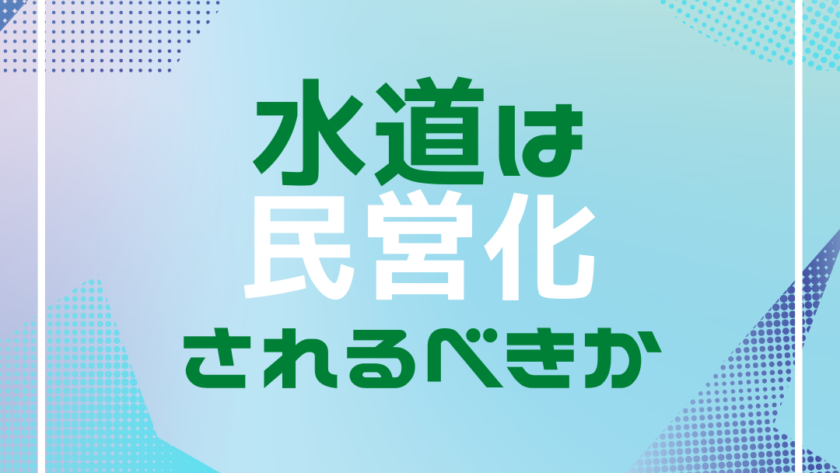目次
Agree Or Disagree: Water Services Should be privatised in Japan.
日本で水道は民営化されるべきか。
POINTS: Water quality / Emergency Response / Maintenance Work / Debit / Human Resources Shortage
観点: 水質 / 緊急対応 / メンテナンス / 負債 / 人材不足
水道民営化論争の背景
電気やガスと違い、水道は居住する地域の地方自治体が運営・管理をしています。しかし、特に地方では、人口減少や過疎化などにより採算がとれない自治体も多くあります。都市でも田舎でも給水のシステムは同じです。ただ田舎の方が、水道管・給水管が広域に及ぶ可能性は高く、また維持費にもなる水道料金を支払う人口が少なく、料金も割高になってしまう傾向があります。もちろん、降水量に起因する場合もあるでしょう。一番安い自治体と高い自治体では使用量20立法メートルで比べると、約6000円も差があるらしいです。
全国の水道管が老朽化し新しい耐震性のある水道管への変更が急がれる中、令和元年に水道法が改正されました。これにより自治体の判断で、水道の民営化が可能になりました。
民営化されるとどういう事が予想されるのか?
海外の例を調べてみるのも良いでしょう。イギリスやフランスなどは長年にわたり民営化されています。
Water privatisation: a dirty story about profit (English)
England’s Water System (English)

賛成派:水道は民営化するべきだ(235 語)
AGREE or DISAGREE; Water should be privatised.
POINTS: Maintenance Work / Debit / Human Resources
Introduction
There are many examples of the failure of water privatisation worldwide. However, given the current situation in Japan explained below, it seems the last resort to keep providing water to the citizens.
世界には水道民営化の失敗例がたくさんあります。しかし、後述している日本の現状を踏まえると、国民に水を供給し続けるには水道民営化は最終手段であるようです。
Discussion 1
Today, the leakage from or damage to water pipes is significantly increasing. To make matters worse, many of the water supply and service pipes have been used way over the period they can last. But it was estimated that it would take more than 130 years to complete all the necessary work if local governments keep owning and managing the water system.
今日、水道管からの水漏れや水道菅の損傷は非常に増えています。さらに悪いことに、水道供給菅や支給菅の多くは耐久期間を大幅に超えて使用されています。しかし、地方自治体に任せておくとすべての必須作業を終えるのに130年以上かかると試算されています。
Discussion 2
Many local governments are in debt and can’t afford the cost. Furthermore, their debt from the water business affects other services they must provide to the residences. Selling the water business to a private corporation could solve two problems at one go; to keep providing water and pay off their debt. In this way, they could also enhance other necessary services.
多くの地方自治体は負債を抱えており、水道管の修繕費用など捻出する余裕はありません。更には、水道事業による負債のため、その地域住民に本来提供しなければならない他のサービスにも影響がでています。民間企業に水道事業を売却することにより二つの問題を、つまり水の供給維持と負債の返済を一度に解決できるでしょう。この方法により他の必要なサービスをも強化することが可能になるでしょう。
Discussion 3
Government-owned water services are also facing a lack of human resources, particularly those who check the conditions of water pipes, some of which are again overused. Accordingly, damages to pipes and leakages would further increase in the future. We are at real risk of losing our safe water supply.
公営の水道は人材不足にも直面しています。特に、濫用されているものを含むすべての水道管の状態を検査する人材です。従って、水道管の損傷や水漏れ将来的にさらに増えるでしょう。安全な水の供給を失う危険がそこまで来ているのです。
Conclusion
Considering the importance of water, we must ensure that water service is always available. Water privatisation is not the best, but there seems no other way to maintain water services.
水がどれほど重要であるかを考えると、確実に水道はいつも使用可能な状態である様にしなければなりません。水道の民営化はベストではありませんが、水道の提供維持には他の方法はないように見受けられます。
賛成派:本文全文(音源つき)
There are many examples of the failure of water privatisation worldwide. However, given the current situation in Japan explained below, it seems the last resort to keep providing water to the citizens.
Today, the leakage from or damage to water pipes is significantly increasing. To make matters worse, many of the water supply and service pipes have been used way over the period they can last. But it was estimated that it would take more than 130 years to complete all the necessary work if local governments keep owning and managing the water system.
Many local governments are in debt and can’t afford the cost. Furthermore, their debt from the water business affects other services they must provide to the residences. Selling the water business to a private corporation could solve two problems at one go; to keep providing water and pay off their debt. In this way, they could also enhance other necessary services.
Government-owned water services are also facing a lack of human resources, particularly those who check the conditions of water pipes, some of which are again overused. Accordingly, damages to pipes and leakages would further increase in the future. We are at real risk of losing our safe water supply.
Considering the importance of water, we must ensure that water service is always available. Water privatisation is not the best, but there seems no other way to maintain water services.
反対派: 水道民営化すべきでない(238 語)
AGREE or DISAGREE; Water should not be privatised.
POINTS: Profits / Water quality / Emergency
Introduction
Water is a fundamental human right and should not be operated by private sectors pursuing profits.
水は基本的人権であり、利益を追及する民間企業が運営するべきではありません。
Discussion 1
The main objective of private companies is to make profits. They may change ageing leaky water pipes swiftly, but they would increase water rates to cover the cost. As a result, people with financial difficulties may lose water supply immediately after unpaid bills. Besides, the population in Japan will keep declining in the future, which means less water will be in demand. Accordingly, water rates would further increase, or they may give up on the unprofitable water business.
民間企業の主な目的は営業利益をあげることです。遅延なく、老朽化し漏れのある水道管を交換するかもしれませんが、そのコストを取り戻すために水道量を値上げするでしょう。結果、財政困難な人達は料金を滞納したらすぐに水の供給が断ち切られるかもしれません。その上、日本の人口はこのまま減少し続けるでしょう。これは、水の需要が今より減るという事です。従って、水道料金はさらに値上げされるでしょう。若しくは、民間企業は利益の出ない水道事業から撤退してしまうかもしれません。
Discussion 2
The water quality, which is currently the third-best worldwide, may drop significantly if private corporations operate the water business in Japan. Improperly-treated sewers might pollute watercourses as well. Indeed, these things happened in the U.K. and France after private sectors ran the businesses. Without studying these cases and measures that would prevent similar tragedies, water privatisation in Japan would also be on the same unsuccessful trajectory.
現在世界で3番目に良いとされている日本の水質ですが、もし民間企業が水道事業を運営すうるとなると、大幅に悪化するかもしれません。適切に処理されなかった下水が、川や海の水を汚染するかもしれません。事実、こういった事が、イギリスやフランスで民間企業が水道事業を運営した後に、起こりました。こういった事例や似たような悲劇を防ぐ方法を分析することをしなければ、日本における水道の民営化もまたおなじ失敗を辿ることになるでしょう。
Discussion 3
Japan has several kinds of natural disasters, such as typhoons and earthquakes, for which people can lose access to safe water. Under such circumstances, water could be readily distributed to the affected areas if public sectors operate water businesses.
日本は、台風や地震といった自然災害がいくつかある国です。こういった災害は、断水の原因になることもあります。このような緊急事態下においても、水道が公的事業であれば被災地で水を容易に配給することができるでしょう。
Conclusion
As many nations that had shifted to water privatisation returned to public ownership for the reasons mentioned above, the same situation would be a likely bet in Japan. Then private sectors should not own or operate water businesses.
水道民営化をおし進めた多くの国々が、前述した理由のために、再び水道を公営化していることから、日本においても同じような事が起きる可能性が高いでしょう。ですから、水道は民間企業が所有したり運営したりすべきではありません。
反対派:本文全文(音源つき)
Water is a fundamental human right and should not be operated by private sectors pursuing profits.
The main objective of private companies is to make profits. They may change ageing leaky water pipes swiftly, but they would increase water rates to cover the cost. As a result, people with financial difficulties may lose water supply immediately after unpaid bills. Besides, the population in Japan will keep declining in the future, which means less water will be in demand. Accordingly, water rates would further increase, or they may give up on the unprofitable water business.
The water quality, which is currently the third-best worldwide, may drop significantly if private corporations operate the water business in Japan. Improperly-treated sewers might pollute watercourses as well. Indeed, these things happened in the U.K. and France after private sectors ran the businesses. Without studying these cases and measures that would prevent similar tragedies, water privatisation in Japan would also be on the same unsuccessful trajectory.
Japan has several kinds of natural disasters, such as typhoons and earthquakes, for which people can lose access to safe water. Under such circumstances, water could be readily distributed to the affected areas if public sectors operate water businesses.
As many nations that had shifted to water privatisation returned to public ownership for the reasons mentioned above, the same situation would be a likely bet in Japan. Then private sectors should not own or operate water businesses.
まとめ
水道民営化が成功している国も数は少ないですが存在します。そういった国々と失敗した国々、どういったところで方針が違うのかしっかり分析した上で、水道民営化を進めないことには日本も数ある失敗例のひとつになってしまうのが関の山です。
市民も見解を深め、行政だけに任せずにパブリックコメントなどでしっかりと自身の意見を表明することが必要です。
こちらの記事もお薦めです。Agree Or Disagree: 日本は捕鯨を中止すべきか。




